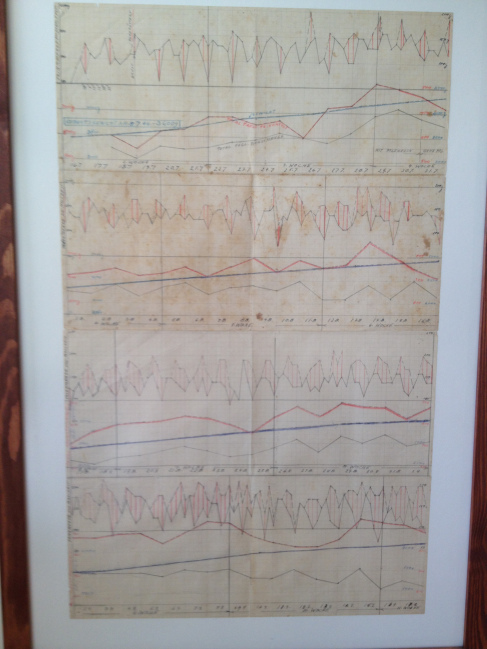The measured life of 1944
My grandfather, Ernest Friedlander, was the quintessential Yekke [1] engineer at a time when their culture played a major part in Israel. He was trained in Germany, like so many of the engineers and architects of that time. In fact, the story goes that when a talk was given at the assembly of engineers in Tel Aviv the audience would not even notice when the speaker would mention “… That method, devised in Eintausendneunhundertzwanzigsieben, is used in…” – interposing the German numbers in the Hebrew text.
My grandfather passed away long before I was born, but only recently, when shuffling through his old papers did my father encounter this – and it immediately brought back vivid memories of his childhood.

The graph, done by hand, is a bit hard to make out with the faded labels and shorthand German. Nevertheless, a single clue almost entirely solves the puzzle: At the very top left corner, encapsulated by a box, it reads ‘8.7.44, 3600g’. That date happens to be my father’s date of birth. And 3.6Kg (8 lbs) was his weight at birth. The amazing part is when you then realize what Ernest had done. He weighed my father daily since he was brought home, a week after he was born. That is the red line. He had also weighed, three times a day, the feeding of my father – both by Brust (breastfed) and then with a supplement, marked red. This constitutes the upper half of each of the pages in the chart. The black line, then, is the net weight, without the food. Finally, he had calculated and drew a regression (trend) line to track the increase in weight. The four pages here are just a small sample my father had framed, recording the first 11 Woche (weeks). There are quite a few more, going up until he stopped breastfeeding. A remarkably tedious and meticulous job, carried on with no break for long months – this is exactly the defining characteristic of the Yekke. But also, it is a reminder how the advanced data culture that we live in today is in fact nothing new. Life was carefully measured even before this guy came around.
Lessons about the history of visualization and the way an engineer expresses his care and devotion aside, for me this discovery was touching because it hints that my fascination with statistics and data – quite an anomaly in my family – might in fact be some sort of trait carried onward by my grandfather’s genes on to me, a part of him that I carry on in my every day life.
[1] a culture of Jewish German nationals who emigrated to Israel mostly in the 30’s, escaping the rapidly Nazifying Germany. Having been mostly secular and deeply entwined in the German middle-class of the time, they are stereotyped as being pedantic, punctual and so pragmatic and rational as to seem unaffectionate.